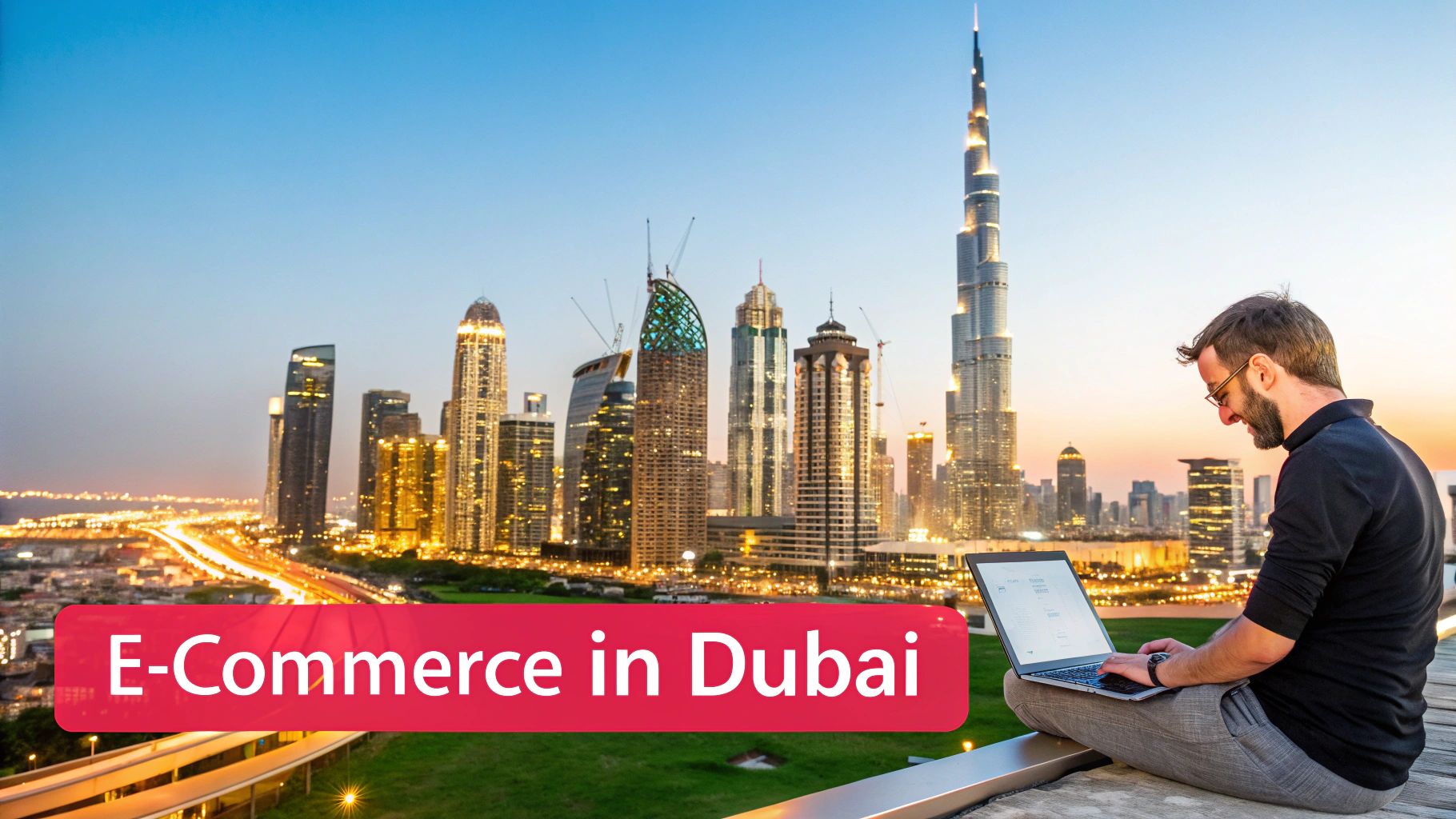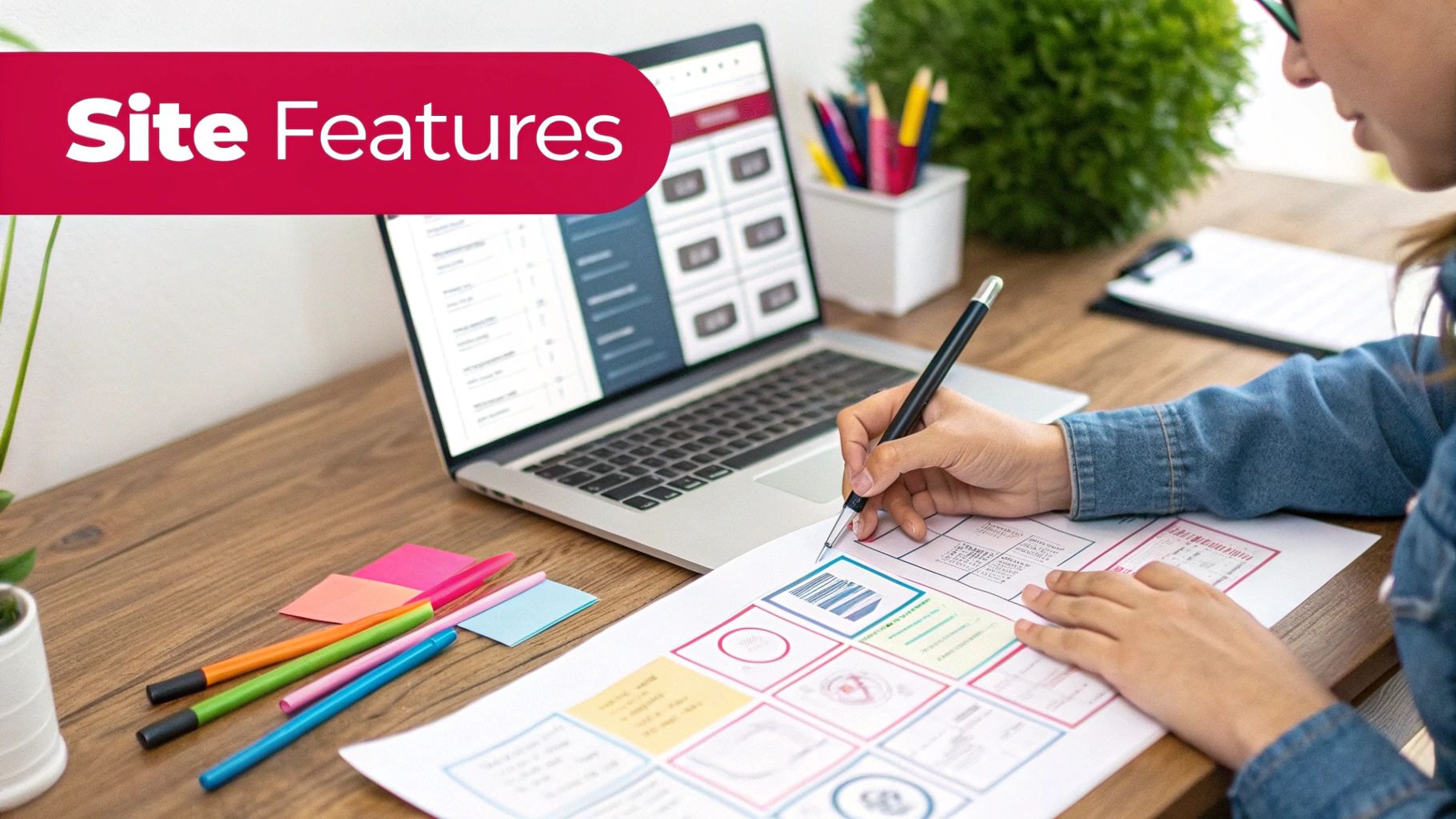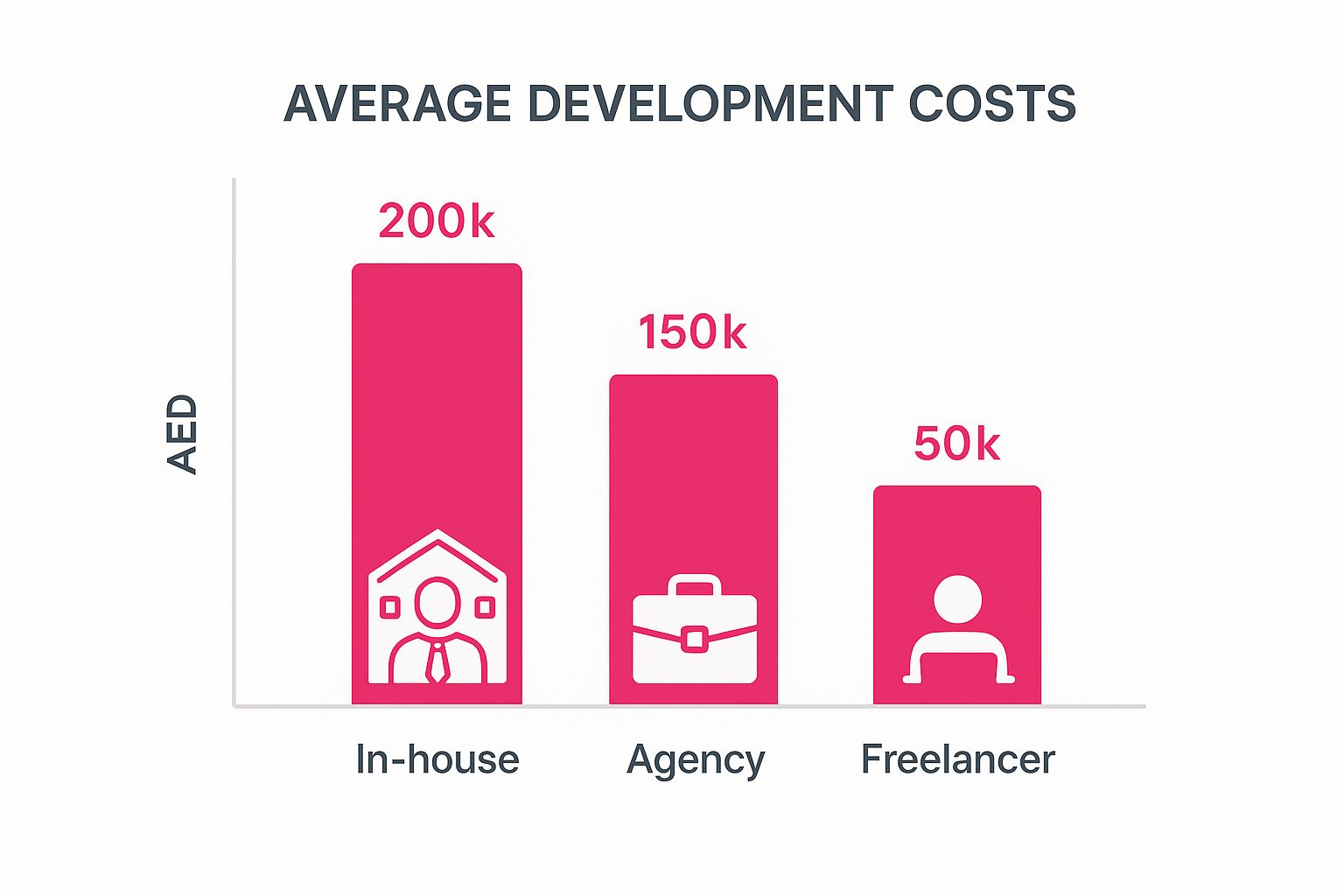Launching an e-commerce website in Dubai is more than just a technical exercise. It’s a strategic move that requires a sharp understanding of the local market, from platform choice and legal paperwork to payment systems and logistics. To succeed, you need to get the fundamentals right, which means navigating everything from the correct trade licence to the unique shopping habits of consumers in the region, especially in booming sectors like fashion and electronics.
Why Your E-Commerce Business Belongs in Dubai

Dubai's e-commerce scene isn't just growing—it's exploding. This digital gold rush is powered by a perfect storm of factors that make it one of the world's most exciting online retail hubs. Think about it: you have incredibly high internet penetration, a population that lives and breathes technology, and a government that's actively pushing for digital innovation. It's the ideal environment for an online business to thrive.
The statistics alone tell a powerful story. In 2023, the UAE e-commerce market was valued at around USD 11.01 million. Projections show it soaring to USD 23.62 million by 2032. That's more than double in less than a decade, driven by a compound annual growth rate (CAGR) of about 11.52%. It’s clear proof of the region's immense digital appetite.
Your Foundational Blueprint for Success
Getting your online store off the ground in the UAE is about building an entire business ecosystem, not just a website. It’s crucial to understand the whole picture, so consulting a complete guide on how to start a business in the UAE is a smart first move to cover all your bases. The legal side, in particular, is something you simply can't afford to overlook.
Before you get lost in the details of web design, it's helpful to have a quick checklist of the core pillars you'll need to establish your online store.
Dubai E-Commerce Launch Essentials
Here’s a quick overview of the core pillars for establishing your online store in the UAE.
| Key Step | Primary Consideration | Why It Matters in the UAE |
|---|---|---|
| Legal Setup | E-trader vs. Free Zone/Mainland Licence | An e-trader licence is great for solo entrepreneurs, but a full e-commerce licence offers more scalability and options. Your choice impacts your scope. |
| Platform Selection | AED Currency & Local Integrations | Platforms like Shopify or Magento must handle local currency (AED) and seamlessly connect with regional payment and shipping partners. |
| Payment Integration | Gateways & 'Buy Now, Pay Later' | You need gateways like Telr or PayTabs. Offering popular BNPL options from Tabby and Tamara is also becoming standard practice. |
| Logistics & Delivery | In-house Team vs. 3PL Partner | Decide how you'll get products to customers. Using a trusted third-party logistics (3PL) partner like Aramex is often the most efficient route. |
This table provides a high-level view, but each step involves its own set of decisions and research. Getting these right from the start will save you countless headaches down the road.
Capitalising on High-Growth Sectors
Some product categories are seeing incredible growth, creating clear openings for new players. If you know where consumers are spending their money, you can position your brand to make a real impact. The smart investment is in sectors that align with the lifestyle and preferences of the modern Dubai consumer.
Success in Dubai's e-commerce space means focusing on what the local consumer values most: convenience, choice, and trust. Your website is the digital storefront, but your understanding of the local culture and business environment is what truly closes the sale.
Here are the top-performing sectors you should keep an eye on:
- Fashion and Apparel: A constant favourite, with high demand for both luxury labels and trendy fast-fashion.
- Electronics and Gadgets: The local love for the latest tech makes this a perpetually lucrative market.
- Groceries and Daily Essentials: The hunger for convenience has supercharged online grocery shopping, and this trend shows no signs of slowing down.
- Beauty and Personal Care: A thriving sector where both big international names and unique niche brands find a loyal following.
Choosing the Right E-Commerce Platform for Your Dubai Store
Picking the platform for your online store is easily the most critical technical decision you’ll make. It’s the foundation for everything—from how you manage orders day-to-day to whether you can scale up when the time comes. This isn't just about comparing feature lists; it's about finding the right engine for your specific business model, budget, and ambitions here in the UAE.
Honestly, the choice usually boils down to three main players: Shopify, Magento (now Adobe Commerce), and WooCommerce. Each one offers a completely different experience, so let's break down which one might be right for you.
Shopify: The User-Friendly Powerhouse
For most startups and small to medium-sized businesses in Dubai, Shopify is the path of least resistance, and for good reason. Its biggest selling point is simplicity. You sign up, and they handle the hosting, security, and all the technical headaches. It just works.
Imagine you're launching a high-end fashion boutique. You need a visually stunning site that’s up and running fast. Shopify is perfect for this. Its themes look incredible on mobile, and the app store lets you add new features with a few clicks. Most importantly, it handles AED pricing out of the box and integrates seamlessly with local payment gateways like Telr and PayTabs.
A word of warning: the "real" cost of a platform isn't just the monthly fee. Always factor in transaction fees, the cost of a good premium theme, and the monthly subscriptions for any essential apps you'll need. A "cheaper" plan can get expensive quickly.
The trade-off for this convenience? You give up some control. While Shopify is very customisable, you can't dig into the code quite as deeply as you can with open-source options. You'll also face transaction fees on top of your payment gateway fees unless you use their in-house Shopify Payments.
WooCommerce: The Flexible WordPress Solution
If you're already comfortable with WordPress or you crave total control, WooCommerce is a fantastic choice. It's a free, open-source plugin that bolts a powerful e-commerce engine onto any WordPress site. This means you own everything—your data, your design, and your hosting environment.
- Complete Customisation: You can build literally anything you can dream of. This is ideal for businesses with unique products or a very specific sales process.
- No Added Transaction Fees: WooCommerce doesn't take a cut of your sales. This can save you a huge amount of money as your business grows.
- A Massive Plugin Library: The ecosystem around WordPress is enormous. Need a complex shipping calculator or a sophisticated subscription model? There's a plugin for that.
The catch? All that power means you're in the driver's seat. You have to arrange your own hosting, keep the site secure, and run updates. If the site crashes or gets hacked, it’s up to you or your developer to fix it. This makes WooCommerce a better fit for people with some technical know-how or a reliable development partner on standby.
Magento (Adobe Commerce): The Enterprise-Grade Engine
When you get to the big leagues, you need a platform built for complexity. Think of a major electronics retailer in the UAE managing thousands of products, multiple warehouses, and both B2B and B2C sales channels. This is where Magento shines.
It’s built from the ground up to handle massive product catalogues, multi-storefronts for different GCC countries, and deep integrations with enterprise systems like ERPs and CRMs. But all this power comes with a hefty price tag. Developing and maintaining a Magento site requires specialist developers and a much larger budget. It's not for beginners or the faint of heart.
Here’s a quick cheat sheet to help you decide:
| Platform | Best For | Key Strengths | Main Considerations |
|---|---|---|---|
| Shopify | Startups & SMEs | Fast setup, easy to use, great support | Transaction fees, less deep customisation |
| WooCommerce | WordPress Users & DIY-ers | Total control, no sales fees, flexible | You handle hosting and maintenance |
| Magento | Large Enterprises | Unmatched scalability, B2B, complex inventory | High cost, needs expert developers |
Once you’ve zeroed in on the right platform, tapping into comprehensive e-commerce development services is the next logical step. The right agency can take your chosen platform and mould it into a high-performance sales machine, perfectly tuned for the behaviours of customers right here in Dubai.
Getting Your E-Commerce Licence in Dubai: The Legal Nitty-Gritty

Before a single dirham changes hands, you need to get your legal house in order. Running an online store in Dubai isn't something you can do casually from your sofa; it demands strict compliance with local regulations, and that journey starts with securing the right business licence. This isn't just a piece of paper—it's the very foundation of a trustworthy and sustainable e-commerce business.
The right path forward really hinges on the size and scope of your vision. You've got two main choices: the e-trader licence or a full-blown e-commerce licence. Nailing this decision from day one is critical, as it will shape your entire long-term strategy.
The E-Trader Licence for Solopreneurs
If you're a one-person show—a solo entrepreneur or a home-based business owner living in Dubai—the e-trader licence from the Department of Economy and Tourism (DED) is your best bet. It was created specifically for individuals selling products or services online via social media or a personal website, all without the overhead of a physical office.
It's a much more affordable and faster route compared to a full commercial licence. It gives you the legal standing to operate your business from home, which is a fantastic start. But, you need to know its limits. You generally can't hire staff or sponsor visas with an e-trader licence.
Full E-Commerce Licence for Businesses Ready to Scale
For those with bigger plans—hiring a team, holding serious stock, or operating from a proper warehouse—a full e-commerce licence is non-negotiable. You can get this licence either on the Dubai Mainland or within one of the city's many free zones.
- Mainland Licence: This gives you the freedom to trade anywhere in the UAE without restrictions. It’s the go-to if you plan on working with government entities.
- Free Zone Licence: This route often comes with attractive perks like 100% foreign ownership and tax exemptions. The trade-off? You might need a local distributor to sell directly on the UAE mainland.
Choosing between a mainland and a free zone licence comes down to your business model, who you're selling to, and where you see your company in five years. Some free zones, like Dubai CommerCity, are purpose-built for e-commerce, offering a complete ecosystem with logistics and support services baked right in.
I've seen too many new entrepreneurs get bogged down by underestimating the legal paperwork. Your licence gives you permission to operate, but your terms of service and privacy policy are your contract with the customer. Both are absolutely essential for building trust and staying out of legal hot water.
Beyond the Licence: Your Essential Legal To-Do List
Getting your licence is a huge milestone, but it's just the start. Real compliance for an e-commerce website development in Dubai means being transparent about your business practices and fiercely protecting customer data. Honestly, this is where many businesses stumble.
The UAE has strong consumer protection laws. The Personal Data Protection Law (PDPL), for instance, lays down strict rules for how you must collect, use, and store your customers' information. Getting this wrong can lead to hefty fines and can seriously damage your brand's reputation.
Your website needs to have crystal-clear legal documents that are easy for any visitor to find. Think of this not as a chore, but as a crucial step in building a foundation of trust.
Here are the legal pages your site absolutely must have:
- Terms of Service: This is the rulebook for using your site. It should cover everything from payment terms and intellectual property to your limitations of liability.
- Privacy Policy: Spell out exactly what customer data you collect, why you need it, how you protect it, and how people can manage their own information.
- Shipping and Returns Policy: Nothing builds customer confidence like a clear, fair policy on delivery times, shipping costs, and how you handle returns or exchanges.
Crucially, you need these documents professionally drafted and available in both English and Arabic. This isn't optional. It shows a real commitment to the diverse UAE market and is a clear signal that you're a serious, professional operation. Skipping this step is a risk you just can't afford to take.
Getting Payments and Logistics Right in the UAE
A beautiful website and sharp marketing might get customers to your digital doorstep, but it’s what happens at the checkout and on the final mile that truly builds a loyal following. In a market as demanding as Dubai, a clunky payment process or a delayed delivery is a surefire way to lose a customer for good. Getting payments and logistics right isn’t just an operational box to tick; these are the very pillars of customer satisfaction and repeat business.
The financial heart of your e-commerce site needs careful planning. You must offer payment methods that are not only secure but also familiar and trusted by shoppers in the region. This means going beyond standard credit cards and embracing the payment habits that define the UAE market.
Choosing the Right UAE Payment Gateway
Your payment gateway is the digital cash register for your store. It has to be rock-solid reliable, simple to integrate, and supportive of the payment types your customers actually use.
I’ve seen too many businesses falter by picking a gateway that doesn't align with local preferences. You can't ignore the 'Buy Now, Pay Later' (BNPL) trend, for instance. Services like Tabby and Tamara have become an expectation for many shoppers, especially for big-ticket items in fashion or electronics. Weaving them into your checkout can seriously bump up your conversion rates by lowering the barrier to purchase.
A seamless checkout isn't a luxury; it's a core feature. The goal is to make paying so easy and intuitive that the customer barely thinks about it. Every extra field or confusing step is a reason for them to leave.
To help you decide, let's compare some of the top players in the UAE.
Top UAE Payment Gateway Comparison
Here’s a comparative look at the leading payment solutions I often recommend to e-commerce businesses starting out or scaling up in Dubai.
| Gateway | Key Features | Best For |
|---|---|---|
| PayTabs | Simple setup, competitive SME pricing, strong security, integrates easily with Shopify and WooCommerce. | Start-ups and small to medium-sized businesses looking for a straightforward, reliable solution. |
| Telr | Highly flexible with tiered plans, supports recurring payments and invoicing, strong API support. | Businesses of all sizes, especially those needing versatile payment models like subscriptions. |
| Checkout.com | A powerful unified platform for global payment processing, handling multiple currencies and regions. | Larger businesses and enterprises with ambitions for international expansion. |
This table gives you a starting point, but always dig into the specific transaction fees and settlement times before making a final decision. Your choice here directly impacts your cash flow and profitability.
Nailing Your Delivery and Fulfilment Strategy
The moment a customer's payment goes through, their focus immediately snaps to one thing: "When will I get my stuff?" This is your chance to either delight or disappoint them. Your logistics strategy must be fast, reliable, and totally transparent.

For most new online stores, I strongly advise partnering with a third-party logistics (3PL) provider. It’s the most sensible way to start. Companies like Aramex and Fetchr have the extensive networks and infrastructure to handle everything from warehousing to that crucial last-mile delivery. This frees you up to focus on growing your brand instead of getting bogged down managing a fleet of drivers.
Of course, as you scale, bringing logistics in-house might offer more control and potentially better cost-per-delivery. But be warned: this is a major operational leap that needs serious financial modelling. Don't jump in too soon.
A key part of your logistics puzzle is managing inventory. Setting up a warehouse in a strategic location like the Jebel Ali Free Zone (JAFZA) can be a game-changer, especially if you plan to serve the wider GCC region. It gives you a central hub for your stock and dramatically improves efficiency.
You're entering a market that’s growing at an incredible pace. By 2025, the UAE e-commerce market was valued at around $11.05 billion, and it's projected to grow at a CAGR of 12.39% to hit a staggering $20.54 billion by 2030. This boom is driven by high mobile wallet adoption and simplified identity verification through services like UAE Pass.
Beyond just accepting payments, you need to protect your revenue. It's vital to get familiar with global transaction challenges, like the common e-commerce chargeback issues, to safeguard your bottom line.
Finally, a quick word on Cash on Delivery (COD). While digital payments are king, a surprising number of customers still prefer COD. Offering it can capture sales you would otherwise lose. To manage the risk, lean on your 3PL partner. They have established systems for secure cash collection, taking that operational headache away from you.
Designing for the Modern Dubai Shopper

Let's be clear: your website’s design is about so much more than just looking good. It’s about crafting a user experience (UX) that clicks with the specific habits and high expectations of shoppers in Dubai and across the GCC. If you're using a generic UX playbook, you're going to miss the mark. To succeed here, you have to get inside the mind of the local customer.
The UAE has one of the highest smartphone penetration rates on the planet, which means it’s a mobile-first market. This isn't just a trend; it's the absolute standard. Your customers are scrolling through Instagram for inspiration, comparing prices on their phones during their commute, and checking out with a few taps. Your e-commerce website development in Dubai must prioritise the mobile experience. If it isn't seamless on a phone, you're already losing.
Embracing Bilingual and Localised Design
To create an experience that feels truly local, you have to speak your customer's language. Dubai is a global melting pot, but offering a fully bilingual site is not optional. Every single part of your website needs to be perfectly translated and easily switchable between English and Arabic—that includes everything from product details and navigation to the checkout process and customer support.
And it’s not just a matter of swapping words. You need a professionally implemented right-to-left (RTL) layout for the Arabic version. It’s fundamental for usability and shows you respect the language.
Localisation goes deeper than language, touching every aspect of the user journey:
- Clear AED Pricing: All prices must be shown in Emirati Dirhams (AED), front and centre. Don't make customers guess or convert currencies; make AED the default.
- Culturally Relevant Visuals: Use imagery that reflects the modern, diverse, and aspirational lifestyle of Dubai. Stock photos with a distinctly Western feel can make your brand seem out of touch.
- Prominent Contact Details: Shoppers here value being able to get in touch. A local phone number and a WhatsApp contact on every page are non-negotiable. It’s a small detail that builds huge trust.
Building Unshakable Trust Signals
Trust is the ultimate currency in any e-commerce market. In the UAE, however, shoppers are especially sharp and actively look for signs that a business is legitimate before they even think about entering their card details.
A beautiful website is only half the job. If a shopper feels even a hint of uncertainty, they’ll abandon their cart without a second thought. Trust is earned through transparency, visible security, and social validation. Every element counts.
Here are the essential trust signals your site absolutely must have:
- Visible Security Badges: During checkout, prominently display your SSL certificate badge and the logos of your payment partners like PayTabs, Telr, or Tabby.
- Genuine Social Proof: Showcase real customer reviews and testimonials, especially from local shoppers. Pulling in user-generated content from Instagram can be a game-changer.
- Clear Policies: Your shipping, returns, and privacy policies need to be easy to find and written in plain language. Vague policies are a major red flag for customers.
Investing in a user-centric site is one of the smartest moves you can make. For a much deeper dive into getting these details right from day one, check out our guide on e-commerce website design in the UAE. It’s these thoughtful design choices that truly separate the online stores that thrive from those that merely struggle.
Marketing Your Online Store to a UAE Audience
Getting your website live is a huge milestone, but it's really just the starting point. Think of it this way: a stunning online store with no visitors is like a beautiful boutique tucked away in an alley with no sign. Your success now comes down to how well you can attract the right customers, and that means building a marketing plan specifically for the UAE's unique consumer culture.
You can't just apply a generic global strategy here and hope for the best. You need to get smart about where you spend your time and money. This means diving deep into the channels that actually work in this region, from the powerhouse of social commerce on Instagram and TikTok to precision-targeted ads on Google.
The opportunity is massive. The UAE e-commerce market was valued at an incredible USD 79.94 billion in 2024. Projections show it soaring to USD 270.5 billion by 2032, a testament to the region's high smartphone penetration and trust in digital payments. If you want to see the full picture, you can read the full research about the UAE e-commerce market and understand just how big this wave is.
Winning on Social Commerce Platforms
Here in the UAE, social media is more than just a place to scroll—it's a primary shopping destination. For countless consumers, platforms like Instagram, TikTok, and Snapchat are where they discover new brands and make instant purchase decisions. A strong, visually-driven presence isn't just nice to have; it's absolutely essential.
Your goal should be to make shopping feel like a natural part of their feed. We're talking about captivating Reels that show your products in action, interactive live shopping events hosted by charismatic personalities, and genuine collaborations with local influencers. The trick is to create content that belongs on the platform, not something that feels like a jarring ad. It requires a real feel for the local culture and what clicks with people here.
To really nail this, you need to understand the nuances of each platform. Our guide to social media marketing in the UAE is a great resource that breaks down the specific tactics you'll need to engage audiences effectively.
Expert Insight: Don't just market a product; market a lifestyle. Shoppers in Dubai and across the UAE are drawn to aspirational content. They want to see how your brand fits into a modern, sophisticated, and globally-connected life. Your marketing needs to tell that story.
Combining Local SEO with Influencer Credibility
While social media is fantastic for building buzz and brand desire, local Search Engine Optimisation (SEO) is your secret weapon for capturing customers who are ready to buy right now. When someone searches for "buy electronics online Dubai" or "same-day dress delivery Abu Dhabi," you need to be there. This means fine-tuning your website's content and your Google Business Profile to show up for these high-intent local searches.
At the same time, influencer marketing carries enormous weight here. A partnership with the right regional personality can be a game-changer, but you have to choose carefully. Forget vanity metrics; look for genuine connection and authenticity. The best collaborations happen when an influencer's audience is a true reflection of your ideal customer.
The real magic happens when you weave these strategies together:
- Smart Local SEO: Optimise your product descriptions, category pages, and blog posts with location-specific keywords that people are actually searching for.
- Influencer Amplification: Have your influencer partners create amazing content that links directly to these SEO-optimised pages, giving you a powerful boost in both traffic and credibility.
- Cultural Tie-ins: Time your campaigns to coincide with major local events and shopping seasons.
For example, launching special collections or promotions around Ramadan, Eid, and the Dubai Shopping Festival is non-negotiable. These aren't just holidays; they are peak commercial periods where cultural relevance can directly translate into a huge uplift in sales for your e-commerce store.
Your Top Dubai E-Commerce Questions Answered
If you're looking to launch an online store in Dubai, you probably have a few questions floating around. It’s smart to get these sorted out before you dive in, as getting clear answers upfront can save you a lot of time and money down the road.
Let's start with the big one: how much does an e-commerce website actually cost here in Dubai? Honestly, there’s no single price tag. You could get a simple Shopify store up and running for a few thousand dirhams plus their monthly subscription. On the other hand, a fully customised, feature-rich site built on a platform like Magento could easily set you back anywhere from AED 50,000 to over AED 200,000. It all comes down to the complexity and features you need.
Getting Legal and Getting Paid
Another common hurdle is the legal side of things. People often ask, "Do I really need a license to sell online?" The answer is a firm yes—it's absolutely mandatory. For a small, home-based business, a DED 'e-trader' license is often enough to get you started. But for any operation with a team and physical inventory, you'll need a proper e-commerce license from either a mainland or free zone authority.
Trust is built on clarity. Your licence makes you legal, but offering familiar payment options makes you trustworthy. In the UAE, this means embracing digital wallets and 'Buy Now, Pay Later' services.
So, how do customers in the UAE prefer to pay? While credit and debit cards are a given, the real game-changers are digital wallets and 'Buy Now, Pay Later' (BNPL) services. Platforms like Tabby and Tamara aren't just popular; they're practically expected by shoppers now. Integrating these options is a non-negotiable if you want to maximise your conversion rates.
Getting these basics right is just the start. A beautiful website is one thing, but you also need a steady stream of customers. This is where a sharp strategy for lead generation in Dubai becomes essential, helping you connect with your target audience and build a loyal customer base right from launch.
At Grassroots Creative Agency, we do more than just build websites; we create high-performing e-commerce realities tailored for the Dubai market. From conversion-focused design to marketing strategies that resonate locally, we’re here to guide you. Get in touch with us to start your journey.








